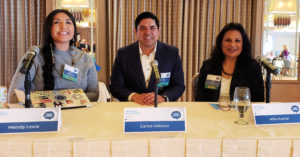Currently in Arizona, 99.4% of all businesses are small businesses, and of those, about 21% are minority-owned businesses, she said.
According to Alika Kumar of the Minority Business Development Agency, people of color, women and underserved communities have been hit disproportionately by the COVID-19 crisis and ensuing economic crisis. “Now it’s estimated that 41% of black-owned businesses, 32% of Latinos in businesses and 26% of Asian-owned businesses closed, while only 17% of white-owned businesses closed as a result of the impact of COVID,” stated Kumar, executive director of the Minority Business Development Agency (MBDA) Business Center in Phoenix. The MBDA is a branch of the U.S. Department of Commerce, which provides minority certification assistance, access to capital contracts, strategic business consulting and help with import/export.
The disproportionate impact on minority businesses is a reminder of the racial disparities, said Kumar, who focused on the benefits of robust minority-owned business sectors.
“Elimination of racial disparities with increased economic efficiency – especially as the minority populations are increasing in numbers in our population – and then removing the barriers to entry and expansion will help increase productivity rate,” she said. “More jobs to generate more revenue create economic and social stability … stimulating the economy and creating a more positive future for all Americans.”
Currently in Arizona, 99.4% of all businesses are small businesses, and of those, about 21% are minority-owned businesses, she said.
Carlos Velasco of Novle, a Valley-based agency that provides businesses with tools to develop relationships with the Latino community, said, “When it comes to economic development for us, transformative work has to start with community building and community organizing and movement building. I think once you accomplish that simple work, then you can begin the market transformative work of educating, of mobilizing and getting people to move into action to empower themselves.”
“I think the three biggest barriers that we have are: one, we need to have some form of legal reform for the documented folks – that’s something that still impacts every Latino in our community; investment in education; and then ultimately, access to capital for small businesses,” said the founder and CEO of Novle.
Melody Lewis of Cahokia is a social entrepreneur dedicated to serving indigenous communities and individuals using collaborative approaches. “Social entrepreneurship is – for those of you that don’t know – I call it ‘the non-profit heart with a for-profit model,’” she explained. Her newly launched project, Cahokia, is a SocialTech and creative empowerment Artspace in downtown Phoenix.
Lewis suggested supporting indigenous populations by investing in indigenous communities. “By not taking advantage… really hiring them, really investing in their programs and not just using,” she said. “Go to the communities and engage in the communities.”
She recommended that people go to indigenous markets or powwows. “Go to learn and immerse yourself in the culture. Learn about the community, then keep showing up and keep trying. It’s about consistency and being visible and creating programs with them, not for them,” the social entrepreneur advised.
Kumar added, “It’s not a handout. It’s not just ‘the right thing to do.’ It’s the economy – we need to drive America’s business growth, economic growth and job creation by helping these communities and businesses in these disadvantaged communities. We should reduce the barriers to access of contracting opportunities and capital.”
Finding Disadvantaged Business Enterprises (DBE)
For a list of minority-, women- and disadvantaged-owned businesses in Arizona with Disadvantaged Business Enterprises (DBE) certifications, go to utracs.azdot.gov/Search
For information about minority-owned suppliers, go to Pacific Southwest Minority Supplier Development Council pswmsdc.org.
AAED presented 10 Golden Prospector Awards and five Awards of Merit to recognize excellence, innovation and creativity in economic development at the annual fall forum. In addition, the organization presented the small population Economic Development Deal of the Year awards to the Economic Collaborative of Northern Arizona (ECoNA) and the City of Flagstaff for recruiting Whitehall Industries, a vehicle manufacturer. It recognized the City of Prescott for recruiting headquarters and manufacturing operations for CP Technologies. FBN
By Stacey Wittig, FBN





